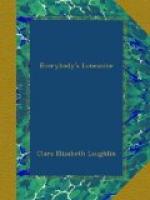“Well, it must have been. For I’ve found some of my own, surely, and I believe I shall find more. And oh! the joy it is to look and look, believing that you will surely find. I haven’t found wealth, nor beauty, nor accomplishments—perhaps I didn’t look in the right places for any of those—but I’ve found something I wouldn’t trade for all the others. It is all I have to bequeath you, dear. But the beautiful part of this bequest is, I don’t have to die to enrich you with it, nor do I have to impoverish myself to give it away. I just whisper something in your ear—and then you go and see if it isn’t so.”
“Whisper it now, please,” begged Mary Alice, going over to her godmother and putting her ear close.
“Oh, no,” said Godmother, kissing Mary Alice’s ear, “this isn’t the time at all. And it’s fatal to tell till the right time comes.”
And no teasing would avail to make her change her mind.
III
FINDING THE FIRST FAIRY
The next few days were spent in sightseeing; and Mary Alice would never have believed there could be any one so enchanting to see sights with as Godmother. They looked in all the wonderful shop-windows and “chose” what they would take from each if a fairy suddenly invited them to take their choice. No fairy did; but they hardly noticed that.
Then they’d go and “poke” in remnant boxes on the ends of counters in the big department stores, and unearth bits of trimming and of lace with which Godmother, who was clever with her needle and “full of ideas,” showed Mary Alice how to put quite transforming touches on her clothes.
They visited art galleries, and Godmother knew things about the pictures that made them all fascinating. Instead of saying, “Interesting composition, that!” or “This man was celebrated for his chiaroscuro,” Godmother was full of human stories of the struggles of the painters and their faithfulness to ideals; and she could stand in front of a canvas by almost any master, and talk to Mary Alice about the painter and the conditions of his life and love and longing when he painted this picture, in a way that made Mary Alice feel as if she’d like to shake the people who walked by with only an uninterested glance; as if she’d like to bring them back and prod them into life, and cry, “Don’t you see? How can you pass so carelessly what cost so much in toil and tears?”
Godmother had that kind of a viewpoint about everything, it seemed. When they went to the theatre, she could tell Mary Alice—before the curtain went up, and between the acts—such things about the actors and the playwright and the manager, as made the play trebly interesting.
On the East Side they visited some of the Settlements and “prowled” (as Godmother loved to call it) around the teeming slums; and Godmother knew such touching stories of the Old World conditions from which these myriads of foreign folk had escaped, and of the pathos of their trust in the New World, as kept Mary Alice’s eyes bright and wet almost every minute.




